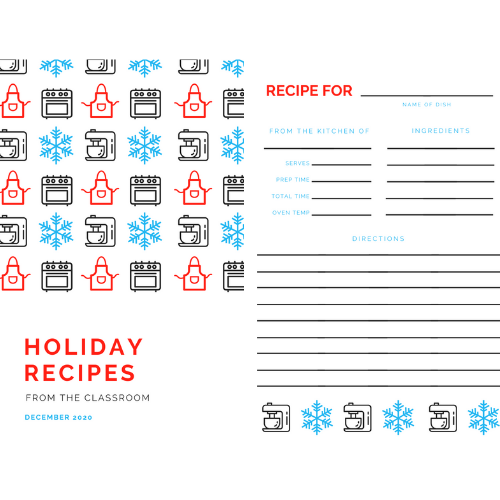An Inclusive Guide to Winter Holidays
- December 8, 2020
- By Katie Kennedy

Inclusive Guide to Winter Holidays
The few weeks before Winter Break are some of the busiest you’ll find in the classroom. Aside from the typical academic work, there is a buzz of excitement coming from students and teachers alike. Everyone is looking forward to those days off and for the opportunity to spend time with family. For many students, opening presents is the real thing to celebrate. Depending on where you live and who your students are, you may find that not everyone celebrates the same holidays as you. Some families may have their own special traditions. What an amazing learning opportunity this can be! As you get ready for the much deserved break, here are some quick tips to keep in mind as you prep for the holiday fun!
Honoring All Celebrations
If you haven’t already done so, the best place to begin is to find out what holidays your students celebrate. As always, the strongest resource will be the parents in the class. Sending home a questionnaire or giving a quick phone call is a seamless way to learn about what should be featured in your classroom. Some parents may even go above and beyond to offer their services with special holiday decor or treats.
Even if a major holiday isn’t celebrated by one of your students, it can still be a fun opportunity to explore something new. In the past, I have buddied up with another teacher and she was able to share her traditions with my class. Your students will have so much fun and grow an appreciation for cultures that may differ from their own.
Thinking of Those Who Don’t Celebrate
Some faiths and students don’t celebrate any particular winter holidays. It is just as important to make those individuals feel included. In my classroom, I’ve been sure to incorporate fun, winter activities that don’t focus on any holiday motifs. Think about snowmen, gingerbread, or even penguins. I know many teachers who spend time on holiday crafts. If you have a wide variety of holiday traditions in your classroom, it may be best to pick one that would work with a Christmas tree, menorah, kinara, or what your students have at home.
Going Beyond ‘Big Gifts’
The final group I want you to think about are the students who may not have the resources to have a big winter celebration. 2020 has been a difficult year for so many and you may not be aware of what’s financially going on at home. Even though children get the most excited about the prospect of gifts and toys, attempt to steer the conversation towards what really matters… things like kindness, compassion, and love come to mind for me. This will be even more important after you come back from winter break. Some of your students, of course, will be gushing about their new toys or where they vacationed. Others may not have that experience. This can be a fine line, but it honestly depends on what your classroom looks like. A good idea is to begin by celebrating the New Year and setting new goals with your students for 2021.Inclusive Guide to Winter Holidays
An Inclusive Holiday Activity

With all of that said, it can be tricky to think of a holiday gift to share with your students. In the years past, I’ve given a cherished book like The BFG by Roald Dahl or Charlotte’s Web by E.B. White. Knowing that so many teachers and students have gone virtual, that may not be possible for so many different classrooms.
One option that I think could work whether you’re in-person, virtual, or hybrid is a class cookbook. I did it all the way back during my internship days and it’s still one of my favorites. For me, it gets double points because it can be used no matter what holiday your students celebrate. All you have to do is reach out to parents and guardians and ask them to submit one favorite family recipe. It can be specific to the holidays or for any time of the year. Here the steps for an easy process:
- Send out a letter to parents and guardians asking for a favorite family recipe. I would also take a moment to thank them for their continued support. Be sure to provide a “due date” so you have enough time to assemble.
- If you are interested in making a physical cookbook, it would be helpful to provide parents with a recipe template to use.
- Online teachers may need to send a virtual copy of the recipe book. You have a few different options. You can either send the template to your parents and scan the recipes or you can have parents email you the recipe instead. Choose what works best for you.
- Each option is going to require quite a few copies. Be sure to give yourself enough time to run off enough for everyone in your class. Feel free to include yourself and your administration.
- So students can take ownership of their new cookbooks, have them involved in the assembling process. Many students will enjoy being involved and it will take a little something off of your plate.
- For many different reasons, parents may not send back a family recipe. To still include those students, have a few extra recipes on the side to “share” with them. You can either hype up the recipes to make them feel special or help them find their own favorite recipe in class during the school day.
- If there are other teachers or faculty who work with your students, invite them to share recipes too. When it comes to the holidays, the more the merrier!
As a holiday gift to you, I’ve taken the time to create a few documents for you to use right away for your cookbooks. Attached, you can find a cover page and recipe template to share with parents. Because I know that there are different classroom settings right now, I’ve also included two versions of the letter to parents. If you have any questions about this activity, be sure to reach out and let me know!
Although it has been an unpredictable start to the school year, I want to personally thank you for your hard work and dedication to your students! We all know that teaching requires so much patience and this year has had more than its share! Please enjoy these last few weeks of 2020 with your students and have fun celebrating the holiday season. Your students will appreciate it more than they’ll ever know!
Be sure to visit the Kids Discover Blog for the latest in free resources, classroom advice, and best practices.
Inclusive Guide to Winter Holidays